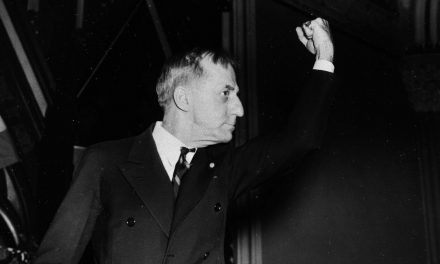Ed Kilgore is properly mystified that Donald Trump has revoked Washington Post reporters’ press credentials, effectively banning the paper from access to himself and his political events. Ed identifies the immediate culprit here as WaPo reporter Jenna Johnson, whose piece on Trump’s remarks about the massacre in Orlando pointed out that Trump has a history of repeating outlandish conspiracy theories and then sticking with them even when corrected by the whole world. What Johnson wrote was a matter-of-fact recitation of recent history. After all, Trump is the nation’s most famous Birther, and he’s repeated a completely discredited story about New Jersey Muslims celebrating the 9/11 attacks, just to give two memorable examples.
Seems clear to me that Trump got caught in a clumsy and audible dog whistle and instead of shrugging it off as he often does, he decided to make an example of Johnson and the Post (assuming being excluded from Trump events is a punishment) for some reason beyond my understanding. But it did so by way of asserting what amounts to a right to be incoherent, and that’s a new one, even for Trump.
The “clumsy dog whistle” is a reference to Trump saying that there is something “inconceivable” about the president’s refusal to use the word’s “radical Muslim extremism” that people just don’t want to believe. What might Trump be referring to? Well, he said that “[Obama] doesn’t get it or he gets it better than anybody understands — it’s one or the other, and either one is unacceptable.”
If the president doesn’t understand the threat of Islamic terrorism, Trump said, he ought to resign because, I guess, he can’t keep us safe. But if he understands the threat just fine but won’t do anything to stop it?
It’s clear that Trump is saying that the latter possibility is what’s “inconceivable” and that people don’t want to believe it.
We can quibble about whether Jenna Johnson characterized this precisely right when she wrote:
Donald Trump seemed to repeatedly accuse President Obama on Monday of identifying with radicalized Muslims who have carried out terrorist attacks in the United States and being complicit in the mass shooting at a gay nightclub in Orlando over the weekend, the worst the country has ever seen.
Did Trump “seem” to suggest “complicity”?
It certainly “seemed” that way to a lot of people who heard Trump’s remarks on Sunday night and in a follow up interview on Fox News Monday.
According to the Washington Post’s story on their own banning, the Trump campaign has already blacklisted reporters at “Gawker, BuzzFeed, Foreign Policy, Politico, Fusion, Univision, Mother Jones, the New Hampshire Union Leader, the Des Moines Register, the Daily Beast and Huffington Post,” but those bans have been temporary in some cases and unevenly enforced. I think this ban is higher profile and probably more permanent.
In a statement, Post Executive Editor Martin Baron said: “Donald Trump’s decision to revoke The Washington Post’s press credentials is nothing less than a repudiation of the role of a free and independent press. When coverage doesn’t correspond to what the candidate wants it to be, then a news organization is banished.
“The Post will continue to cover Donald Trump as it has all along — honorably, honestly, accurately, energetically and unflinchingly,” Baron continued. “We’re proud of our coverage, and we’re going to keep at it.”
Ordinarily, the idea behind banning (or, more commonly, threatening to ban) a reporter is to get his or her editors to back off asking for tough and critical coverage. Most papers would find lack of access to a presidential campaign rather crippling. But that kind of intimidation will never work with an organization as powerful and well-placed as the Washington Post. What this has assured is that the Post has no remaining incentives to pull any punches.
It’s true that Trump might not notice much difference. Things haven’t been going well with the Post since he met with the editorial board in March and exposed himself as an ignoramus. You should revisit the transcript of that meeting because it’s somewhere between hilarious and terrifying, just like the Trump campaign itself.
It’s not unprecedented for a president to have a strained relationship with the Washington Post, but it didn’t end well for Richard Nixon. I can’t imagine how things would go for President Trump.





